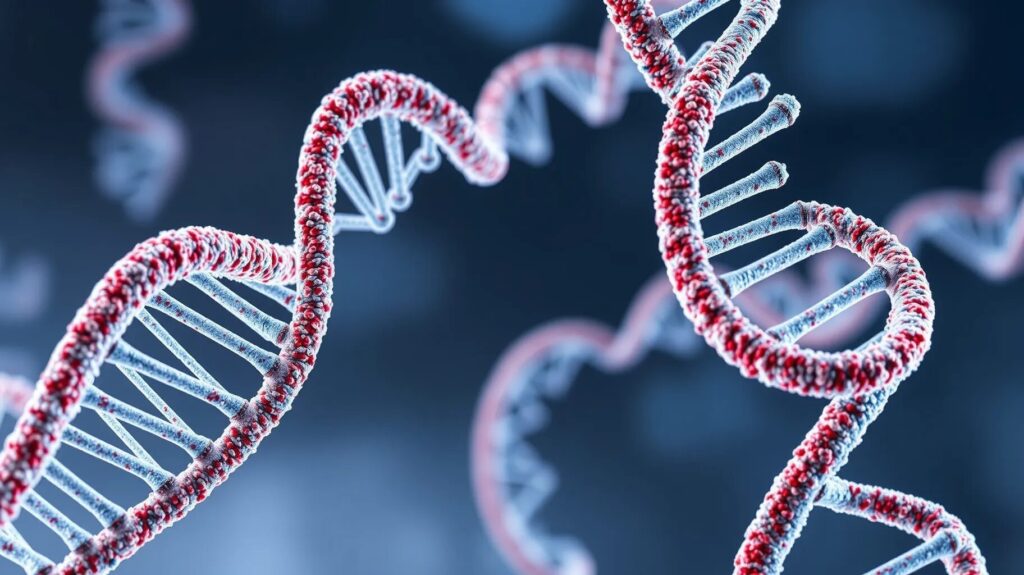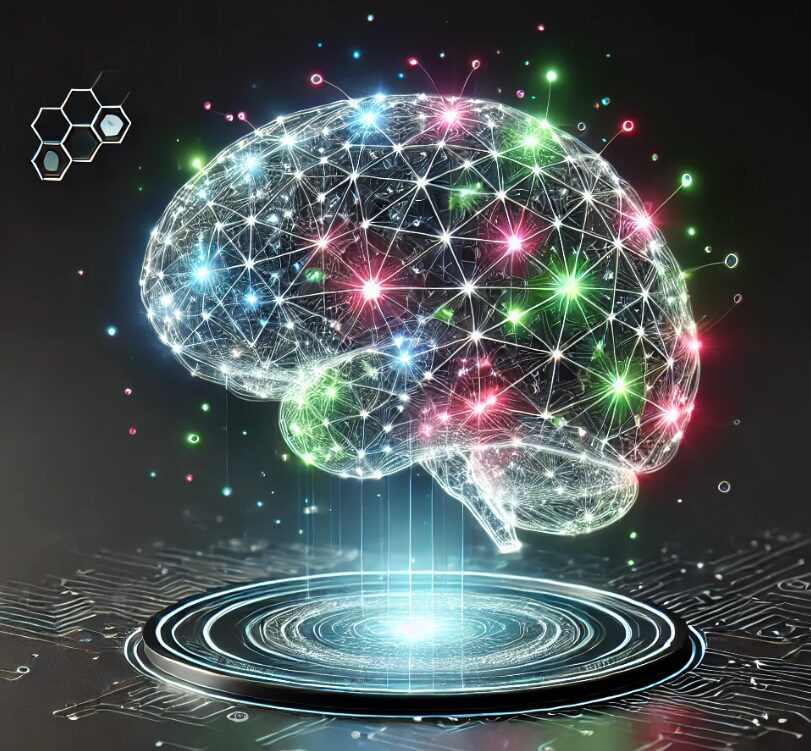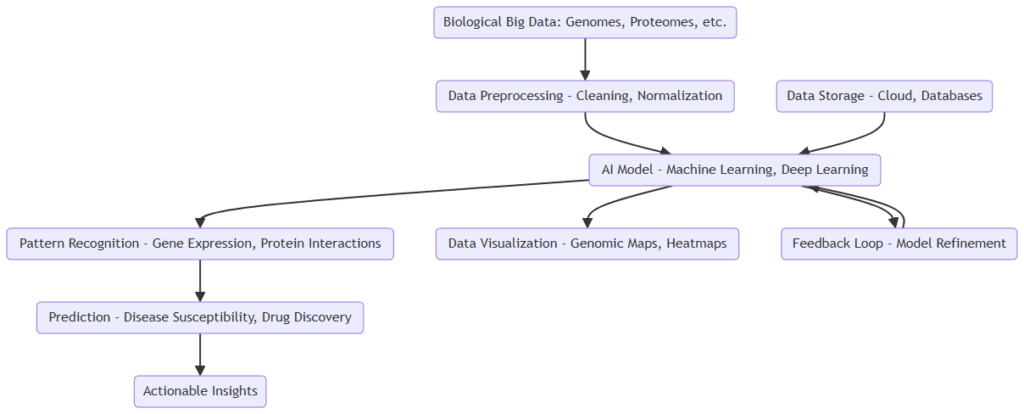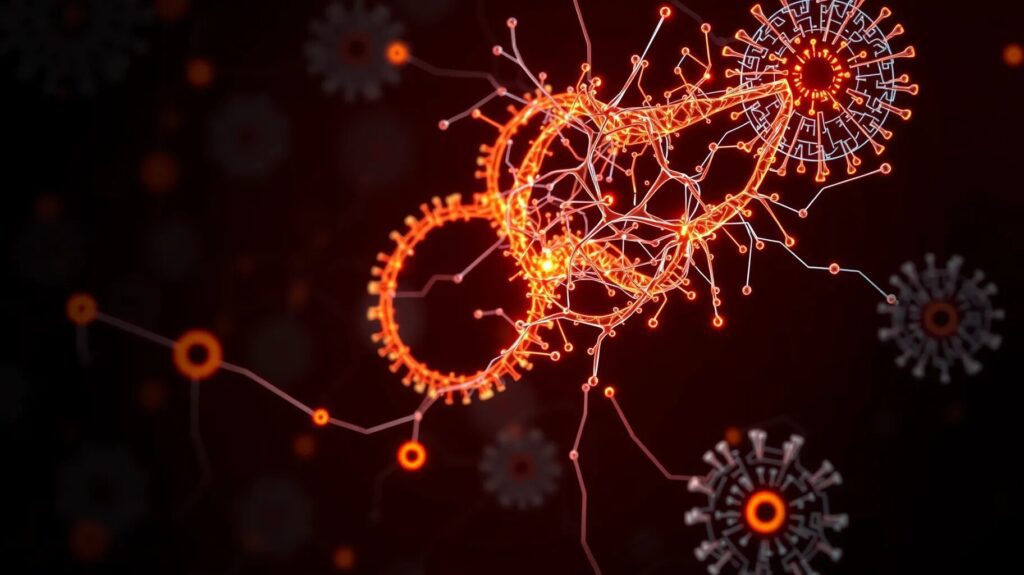
Will Artificial Intelligence soon understand biology? It’s a question that feels less science fiction and more reality every day. Recent advancements in AI are propelling our understanding of biological systems like never before. From genomics to protein design and computational biology, AI is paving the way for breakthroughs that once seemed decades away.
The Fusion of AI and Biology: Why It Matters
Artificial Intelligence is no longer just a tool for data crunching or predictive algorithms. It’s now becoming an integral part of understanding the complexity of biological systems. This fusion between AI and biology offers a powerful new way to decode life itself.
For years, biologists faced insurmountable challenges when trying to make sense of the enormous amounts of data generated by experiments. Now, with machine learning algorithms, AI can spot patterns, predict outcomes, and even propose solutions. It’s not an overstatement to say this could transform medicine as we know it.
AI and Genomics: A Revolution in Personalized Medicine
One of the most exciting applications of AI in biology is its role in genomics. Genomics refers to the study of the complete set of DNA (including all of its genes) in an organism, and it’s at the heart of personalized medicine.
AI algorithms have made it possible to analyze vast genomic datasets faster and more accurately than ever before. By doing so, AI can help identify genetic markers for diseases, predict how a patient might respond to a particular treatment, and even discover new therapeutic targets. This means treatments tailored specifically to a person’s genetic makeup—a level of precision medicine previously out of reach.
Protein Folding: The AlphaFold Breakthrough

You can’t talk about AI and biology without mentioning AlphaFold. This AI system, developed by DeepMind, solved one of the toughest problems in biology—predicting protein structures from amino acid sequences. Proteins, the building blocks of life, need to fold into specific 3D shapes to function correctly. But predicting how they fold was, until AlphaFold, one of the biggest unsolved mysteries.
AlphaFold’s success has revolutionized structural biology. With its ability to predict protein structures with high accuracy, scientists can now better understand diseases caused by misfolded proteins, like Alzheimer’s and cystic fibrosis. It also opens up new avenues for drug discovery and protein design.
Computational Biology: AI’s Role in Drug Discovery
Drug discovery is another area where AI is flexing its muscles. In computational biology, AI can simulate complex biological systems and predict how new drugs might interact with them. This not only speeds up the drug discovery process but also reduces the cost—important factors given that traditional methods are time-consuming and expensive.
AI tools are now used to screen thousands of compounds for potential as drug candidates. They can predict how molecules will interact with targets like proteins or DNA, helping researchers focus on the most promising compounds. AI’s role in drug discovery is growing, and we’re likely to see faster development of treatments for diseases that have remained elusive for years.
The Ethical Considerations of AI in Biology
While AI in biology holds immense promise, it’s essential to consider the ethical implications. With AI handling such critical aspects of human health and biology, there are concerns about data privacy, bias in AI models, and even the potential misuse of technology. For example, AI systems that analyze genetic data could lead to issues of genetic discrimination if not properly regulated.
Moreover, as AI continues to advance, we must ensure that the technology serves humanity’s best interests. Balancing innovation with ethical responsibility will be crucial as AI takes on a more significant role in biological research.
The Role of AI in Understanding Evolutionary Biology

Evolutionary biology is another area where AI is starting to have a profound impact. Traditionally, evolutionary biologists have relied on fossil records, DNA comparisons, and observational studies to understand how species evolved over time. Now, AI is stepping in with predictive models that simulate the processes of evolution.
Machine learning can sift through vast genetic data to identify evolutionary patterns much faster than a human ever could. This is helping biologists understand how mutations lead to changes over generations and how species adapt to new environments. For example, AI models are now able to predict which genetic traits will become more common as a result of environmental pressures, like climate change.
AI-Driven Synthetic Biology: Building Life From Scratch
Synthetic biology aims to redesign organisms or create entirely new biological systems using engineering principles. Here, AI’s role is becoming indispensable. Imagine designing a microorganism to produce biofuels, or creating bacteria that can consume plastic waste—AI is helping scientists make these ideas a reality by modeling complex genetic interactions and predicting how newly designed organisms will behave in real-world conditions.
AI is also accelerating gene editing techniques like CRISPR, allowing researchers to modify organisms with greater precision and speed. With AI, synthetic biology is on the verge of creating custom organisms that could revolutionize industries from medicine to agriculture.
Using AI to Model Complex Biological Networks
Understanding biological networks—the interactions between different molecules, genes, and cells—is one of biology’s most daunting challenges. These networks are often so complex that even the most sophisticated human minds struggle to make sense of them. AI, however, excels in this area.
By analyzing vast amounts of biological data, AI can map out how different parts of a cell communicate with each other, or how various genes turn on and off in response to environmental stimuli. This has enormous implications for understanding diseases like cancer, where gene networks can become misregulated, leading to uncontrolled cell growth.
AI and Neuroscience: Mapping the Brain

Neuroscience is another frontier where AI is making significant contributions. The human brain, with its billions of neurons and trillions of connections, is one of the most complex biological systems known to science. Understanding how the brain works could unlock treatments for diseases like Alzheimer’s, Parkinson’s, and even mental health conditions like depression and anxiety.
AI is being used to create brain maps that show how different regions of the brain interact, helping neuroscientists pinpoint areas responsible for specific functions like memory, movement, or emotion. In addition, AI algorithms are being used to interpret brain scans, improving the diagnosis and treatment of neurological conditions.
Predictive Health: The Future of Disease Prevention
The ultimate goal of using AI in biology might be predictive health—the ability to predict and prevent diseases before they occur. AI systems that analyze biological markers, like changes in proteins or gene expression, could alert doctors to early signs of diseases like cancer or diabetes, long before symptoms appear.
By integrating data from wearable devices, medical records, and genetic testing, AI could help create a personalized health plan tailored to each individual’s unique biology. Imagine a future where AI helps you make decisions about your diet, exercise, or even your medications based on your real-time biological data.
AI and Environmental Biology: Tracking Ecosystems and Wildlife
Artificial intelligence is also making waves in environmental biology, where it’s being used to monitor ecosystems and wildlife populations more effectively. Traditionally, tracking species and their interactions with the environment has been a labor-intensive process. But now, AI can analyze satellite images, sound recordings, and even drone footage to monitor wildlife in real-time.
This technology helps conservationists identify endangered species, understand migration patterns, and detect changes in ecosystems due to factors like climate change. By automating these processes, AI provides more accurate and timely insights, helping us protect biodiversity in ways that were previously unimaginable.
AI in Agriculture: Optimizing Plant Biology
In the field of agriculture, AI is being harnessed to optimize plant biology and crop production. Farmers have long relied on trial and error to improve crop yields, but AI offers a data-driven approach to precision agriculture.
By analyzing data from soil sensors, weather patterns, and plant health indicators, AI can predict the best times to plant, water, and harvest crops. Additionally, AI algorithms are helping to identify genetic traits in plants that make them more resistant to disease or better able to withstand extreme weather conditions. This could be a game-changer as we face the challenges of feeding a growing global population while battling climate change.
AI-Assisted Bioinformatics: Managing Big Data in Biology

Bioinformatics is one of the biggest beneficiaries of AI. As biology becomes more data-driven, the field of bioinformatics—essentially the intersection of biology and IT—has grown exponentially. But managing these huge datasets has always been a challenge.
AI has revolutionized how bioinformatics handles big data. Algorithms are now able to sift through genomic sequences, protein interactions, and biological pathways to find patterns that humans may overlook. This makes it easier for researchers to connect the dots between genetic variations and diseases, helping speed up discoveries in both human health and evolutionary biology.
AI in Disease Modeling: Fighting Global Pandemics
AI has become a critical tool in disease modeling, especially during global health crises like the COVID-19 pandemic. Machine learning models can predict how infectious diseases will spread, which regions will be most affected, and how interventions like lockdowns or vaccines might alter those outcomes.
In addition to helping control outbreaks, AI plays a vital role in vaccine development. By analyzing the genetic makeup of viruses, AI can speed up the identification of key viral proteins that can be targeted by vaccines. During COVID-19, AI helped compress what might have taken years into months, leading to the rapid development of effective vaccines.
AI’s Role in Decoding the Microbiome
The microbiome—the community of microorganisms that live in and on our bodies—plays a crucial role in our health, influencing everything from digestion to immune function. But understanding the microbiome is no small feat. The sheer number of microorganisms involved makes it a complex biological puzzle.
AI is helping researchers unravel this complexity by analyzing the vast amount of data generated by microbiome research. By identifying patterns in how different bacteria interact with each other and with our bodies, AI could lead to breakthroughs in areas like gut health, mental health, and even treatments for chronic diseases like inflammatory bowel disease.
AI and Pharmacogenomics: Tailoring Medications to Your DNA
Pharmacogenomics is the study of how a person’s genes affect their response to drugs. This field is gaining a massive boost from AI, which is now being used to predict how different individuals might react to various medications. By analyzing a patient’s genetic profile, AI can help determine the most effective treatment with the fewest side effects—ushering in a new era of personalized medicine.
This means no more one-size-fits-all drug prescriptions. Instead, AI could recommend treatments specifically tailored to your DNA, ensuring optimal efficacy and minimizing adverse reactions. In the future, AI might even help doctors fine-tune dosages in real-time based on how a patient’s body metabolizes a drug.
AI in Cancer Research: Targeted Therapies and Early Detection

In the battle against cancer, AI is showing incredible potential for both early detection and targeted therapies. AI models can analyze medical imaging, like mammograms or CT scans, with remarkable accuracy, sometimes spotting tumors that human eyes miss. This improves early detection, giving patients a better chance at successful treatment.
Furthermore, AI is helping to develop targeted cancer therapies by identifying specific genetic mutations responsible for different types of cancer. With this information, researchers can design treatments that target the exact molecular mechanisms of the cancer, making treatments more effective and reducing the damage to healthy cells. AI-driven cancer research is leading to personalized cancer care that is far more precise than traditional approaches.
AI-Powered Diagnostics: The Future of Lab Work
AI is revolutionizing diagnostics by automating many tasks that used to require a skilled technician. For example, AI algorithms can now analyze blood samples, biopsies, and even genetic tests faster and with greater precision than ever before. This leads to faster diagnoses, which is critical for diseases like sepsis, where early treatment can mean the difference between life and death.
Beyond speed, AI diagnostics also bring greater accuracy, reducing the risk of human error in the interpretation of test results. Hospitals and laboratories are increasingly adopting AI-based tools, which could one day become a standard part of routine medical care, improving outcomes across the board.
AI and Stem Cell Research: Pushing the Frontiers of Regenerative Medicine
Stem cell research is one of the most promising areas in regenerative medicine, and AI is playing a crucial role in advancing it. Stem cells have the unique ability to develop into any cell type in the body, making them a potential game-changer for treating conditions like Parkinson’s disease, spinal cord injuries, and even heart disease.
AI is helping researchers identify the best ways to grow and differentiate stem cells, ensuring they turn into the desired cell type—whether it’s a neuron, muscle cell, or skin cell. This accelerates research and makes stem cell therapies a more viable option for treating a wide range of diseases. AI’s ability to model the behavior of stem cells in different environments is also helping to reduce the risks associated with these treatments, making the future of regenerative medicine more promising than ever.
The Future of AI in Biology: What’s Next?
Looking ahead, the future of AI in biology seems limitless. As machine learning models become more sophisticated and biological data grows exponentially, AI’s ability to decipher the mysteries of life will only increase. We could soon see AI playing a key role in curing genetic diseases, slowing aging, and even extending human life.
One particularly exciting area of research is the development of biological neural networks—essentially combining AI and biology to create hybrid systems that could one day replicate the human brain. Such advancements are still in their infancy, but they hint at a future where the line between biology and technology becomes increasingly blurred.
While AI may not “understand” biology in the human sense just yet, it is undeniably reshaping how we explore and manipulate the biological world. As the partnership between AI and biology grows deeper, we may very well see the dawn of a new era—one where AI helps us not only understand life but also improve it in ways we are only beginning to imagine.
Breakthroughs: Protein Design, Genomics, and Cancer Detection
Recent research in the field of AI and biology is pushing the boundaries of what we thought possible, with groundbreaking advancements occurring across multiple areas.
One of the most exciting developments is the AlphaProteo system by DeepMind, which builds on their previous work with AlphaFold. AlphaProteo generates novel proteins that can bind to specific target molecules, a breakthrough with enormous potential for drug discovery and disease understanding. This new AI model has the capacity to rapidly design proteins with precise biological functions, opening up possibilities in fields such as biosensor development and personalized medicine
Another notable advancement comes from genomics research, where AI tools are being used to decode the “language” of DNA. For example, a Harvard team has developed a system that deciphers the complex regulatory code of genes from microbial data. This deep learning-based approach allows scientists to predict gene functions more effectively, accelerating discoveries in genomics and furthering our understanding of gene regulation.
In oncology, generative AI is being used to revolutionize cancer detection and diagnosis. These models help in analyzing medical images to detect cancers at earlier stages, improving patient outcomes. AI-powered tools are even showing promise in automating the process of tumor mapping, leading to more precise targeted therapies.
These advances are also spilling over into synthetic biology, where AI is aiding the creation of new biological systems from scratch. Researchers are leveraging AI to model genetic interactions and optimize gene editing tools like CRISPR, leading to innovations in fields such as regenerative medicine and environmental biology.
In short, AI is dramatically transforming biology, accelerating research across a wide range of subfields, and promising to reshape healthcare and biotechnology in the near future.
Key references for the latest research advancements in AI and biology
- AlphaProteo by DeepMind – A cutting-edge AI system designed to generate novel proteins for biological research, with significant implications for drug discovery and disease understanding. For more information, you can explore this groundbreaking advancement at DeepMind’s official research page:
(Google DeepMind)ps://deepmind.google/research/publications/). - Generative AI in Cancer Detection – AI-powered models are being used in medical imaging to detect cancers at earlier stages and to enhance tumor mapping. This helps improve the accuracy of targeted therapies. Read more about the im(AIM)his report:
AI in Cancer Research. - AI in Genomics – Researchers from Harvard are developing AI systems to de(AIM)e, accelerating progress in gene function prediction and genomics. Learn about their deep learning innovations here:
Harvard AI Genomics Study.